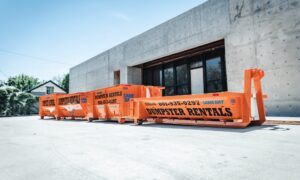Home renovations can quickly spiral into complex ventures, particularly when you factor in waste disposal. Renting a dumpster is a standard solution for handling the debris, but it’s not as straightforward as it might appear. Ensuring compliance with local regulations is a pivotal step often missed by many eager renovators. Securing the proper permits is more than just a formality; it’s a necessity that can prevent costly fines and project delays. It’s critical to acquaint yourself with the specific stipulations of your municipality regarding dumpster use. From placement restrictions to time limits, each aspect must be meticulously considered to ensure your renovation proceeds without regulatory hitches. A reputable dumpster rental service can provide invaluable guidance, ensuring that you stay on the right side of the law while focusing on transforming your home.
1. Know When Permits Are Required:
Before the first tile is removed or the wall knocked down, determine if your area mandates a permit for dumpster placement, mainly if it will inhabit a public area such as a street or sidewalk. Skipping this step can be a pricey oversight, resulting in fines that will bloat your renovation budget. Each city has its requirements, and a trusted company like GJ Roll Away Dumpster Rental will be familiar with these. It can assist in acquiring the necessary permits, ensuring you’re in full compliance.
2. Dumpster Placement Regulations:
Choosing a spot for your dumpster is more complex than finding the most convenient place. Local ordinances may dictate:
- Maintaining clear access for pedestrians and avoiding encroachment into public rights of way.
- Ensuring the dumpster doesn’t block access to public utilities.
- Keeping a set distance from intersections for clear visibility and traffic flow.
- Liaising with your dumpster rental company is vital. They’re the experts who can steer you in the right direction, ensuring your dumpster’s location is legal and practical.
3. Understanding Rental Period Limitations:
The duration for which you can keep a dumpster on-site can be regulated. Some places allow it only for a few days, while others may be more lenient. Stretching beyond these stipulated times can lead to extra charges or the hassle of renewing permits. It’s crucial to be clear on these time frames to plan your renovation phases accordingly and avoid potential penalties.
4. Public Works and Safety Concerns:
Public safety should be emphasized. Regulations may require:
- Ensuring dumpsters maintain traffic sightlines and pedestrian safety.
- The use of safety measures such as cones and reflective materials for visibility.
- Placement on stable, hard ground to prevent accidents or damage.
- Your local public works department or dumpster rental provider can offer guidance, ensuring your dumpster doesn’t become a public hazard.
5. Restrictions on Hazardous Materials:
Not all waste is created equal. A dumpster might seem like a catch-all, but hazardous materials are a no-no. Items like batteries, chemicals, and certain electronics need unique disposal methods. The consequences of ignoring these restrictions range from environmental damage to legal repercussions. It’s vital to discuss with your dumpster rental company what materials are permitted for disposal in your rented unit.
6. Weight Limits and Overfilling Penalties:
Dumpster rental agreements will stipulate weight limits to prevent overloading. Surpassing these limits can result in overage fees, so it’s wise to understand the capacity of your chosen dumpster and plan waste disposal accordingly. For instance, if you discard heavy materials like concrete, you may need a dumpster to handle the extra weight.
7. Considerations for Dumpster on Private Property:
Even on private property, there are considerations to bear in mind:
- Positioning the dumpster to avoid damage to the property and not to block access.
- Ensuring the placement doesn’t hinder emergency services.
- A thorough discussion with your dumpster rental company will help to identify any specific guidelines you need to follow.
When it comes to renting a dumpster, taking these regulations and considerations into account will smooth out the renovation process, making waste management the least of your worries on the path to a renewed space.
In Conclusion
In DIY and renovation, knowledge of local regulations and permits is as crucial as the tools you wield. Renting a dumpster—seemingly straightforward—becomes complex when legalities enter the fray. This isn’t mere red tape; these regulations are the blueprint to navigate a project without incurring fines or causing delays. A partner like GJ Roll Away Dumpster Rental isn’t just a service provider; they’re your project’s ally, ensuring that the mundane aspects of compliance are managed, allowing you to focus on the vision of your home’s transformation.
Embrace these rules not as hurdles but as strategic steps toward completing your renovation dreams. When you engage with the process, consulting experts and adhering to the guidelines, you’re not just renovating a space—crafting a narrative of efficiency and responsibility. In that narrative, renting a dumpster transitions from a mere task to an integral element of your renovation saga, underscoring your role as a conscientious homeowner and savvy renovator.



































